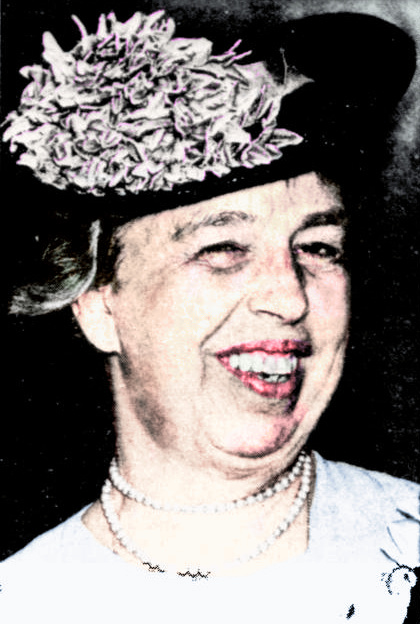
MY DAY
By Eleanor Roosevelt
December 2, 1940
Washington, Sunday –
Yesterday morning, I enjoyed the most beautiful exhibition in the Labor Department auditorium. This is the main one in Washington, DC, put on for Art Week. It features not only arts and crafts, made by District of Columbia artists, but contributions from all over the country. There are other exhibitions dotted all around the city. In the Procurement Division of Fine Arts, there is a delightful collection of water colors.
I wish I could have seen them all. In the meantime, I bought a number of things which exemplify the variety of exhibits. I was interested to have Mr. Ed Rowan, who is responsible for the hanging of this exhibition, tell me that the names of the artists showed, as they did in Chicago, the great variety of races which make up our cultural background and which have contributed to the development of our civilization.
On Friday evening, Mr. Jerome Davis, who has been appointed by the YMCA to take charge of their program in connection with prison and concentration camps in Canada, told us a little of what this work means. It is not only a humanitarian effort to make the lives of men who live within barbed wire entanglements a trifle more human, but contributed greatly to the willingness on the part of the Axis nations to allow YMCA representatives to do similar work in Germany.
There are some two million people in prison in concentration camps in Germany as against a few hundred thousand in Canada. If good work is done in Canada, it gives an opportunity to the representatives serving in Germany to ask for the same type of work to be done in camps in Germany.
It is curious that Mr. Davis, who served in this same capacity during the World War, should find himself confronted with the same problems and be again devoting his life to the same type of work.
Yesterday afternoon, I saw some of the most interesting documentary films. We have not come to realize the full value of these films in this country, but gradually we are awakening to their possibilities. The films which I saw were Wings Of Youth, Valley Town, And So They Live, Atlantic Patrol, They Also Serve, Youth Gets a Break, and Look To Lockheed For Leadership.
The films should, of course, be distributed through the regular distributors. It would mean education in citizenship to many of our people. We are too apt to be ignorant of both the needs in our communities and the efforts which are being made to meet these needs and, therefore, these efforts do not receive our wholehearted support.
The weather seems to be fine and we are flying to Texas this morning